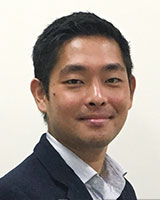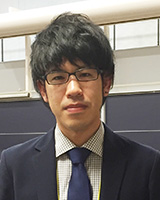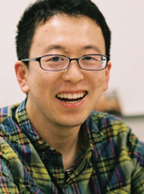Messages from our alumni
*Affiliations are as of the time of the interview.
WANG Yen PoINOPASE Inc., Co-founder & CTO
- 2018: Graduated from Universidad Autonoma de Ciudad Juarez, Biomedical Engineering
- 2020: Master’s degree in the Department of Human and Engineered Environmental Studies
- 2024: Doctoral degree in the Department of Human and Engineered Environmental Studies
During my time at the University of Tokyo, I learned not only how to become a qualified researcher but also how to challenge myself to achieve more. The department provided me with invaluable opportunities, including sponsorship to attend international conferences, which allowed me to expand my global network and refine both my research and communication skills. These experiences enabled me to secure prestigious scholarships such as the Otsuka Toshimi Scholarship and the UTokyo International Graduate Program of Innovation for Intelligent World during my Master’s and PhD studies.
My journey as a PhD student was transformative. Beyond academic growth, the department encouraged me to explore entrepreneurship, offering programs and patent support that laid the foundation for my company, INOPASE Inc. Through relentless effort, support from the university, and the reputation of my department, I was able to secure significant investments to grow my company. This hard work, combined with the supportive environment around me, led to the unexpected honor of being recognized by Forbes 30 Under 30 Asia-Pacific in healthcare.
To those considering joining this department, I encourage you to imagine the possibilities. With the resources, mentorship, and global opportunities available, your potential is limitless. Whether in research, entrepreneurship, or any other path, you can achieve extraordinary things—perhaps even greater than I have. Embrace the challenge, dream big, and work tirelessly toward your goals. The University of Tokyo can be the beginning of your extraordinary journey.
YOSHIDA LuiAssociate Professor, Graduate School of Engineering, The University of Tokyo
- 2010: Graduated from Systems Innovation, Faculty of Engineering
- 2012: Master’s degree in the Department of Human and Engineered Environmental Studies
- 2015: Doctoral degree in the Department of Human and Engineered Environmental Studies
I am engaged in various activities and research in educational technology, with a strong desire to improve education. I am particularly interested in online education and active learning. I am developing online educational tools and programs, and supporting teachers in their desire to improve their courses. Online education has gained much attention due to the COVID-19 pandemic, so I am busy with a lot of work. My daily life is fulfilling, since I am carrying out work that I enjoy.
I researched biomedical engineering in the Department of Human and Engineered Environmental Studies, which is seemingly unrelated to educational technology. But I believe I gained useful skills, even though I am working in new fields with my research activities in the department. These include developing creative and logical thinking skills, such as “What is the originality of my research, taking into account previous research?” and “What kind of logic is necessary to assert the originality?” and the flexibility and tenacity to try again even after making a mistake.
Studying in the Department of Human and Engineered Environmental Studies will be a sound basis for your future. I hope that all students will enjoy immersing themselves in their research!
MURAMATSU DairokuAssistant Professor, Department of Electrical Engineering, Faculty of Science and Technology, Tokyo University of Science
- 2011: Graduated from Faculty of Science and Technology, Tokyo University of Science
- 2013: Master’s degree in Human and Engineered Environmental Studies
- 2016: Doctoral degree in Human and Engineered Environmental Studies
Since human bodies absorb electromagnetic waves, our bodies can become obstacles to general radio communication systems. When I was a graduate student, my research theme was a new communication system, namely “Intra-body Communication”, in which we in effect use the human body as a path for electromagnetic waves. Interactions between electromagnetic waves and the human body, which is intricately composed of many tissues, were hard to understand, and we approached the subject in an integrated manner, through both experiments and numerical analyses. Now, as an assistant professor in the department in which I got my bachelor’s degree, I am working on designing physical layers of digital radio communication.
In the graduate school, faculty and students with varied backgrounds get together, and there are many opportunities for international research exchanges.
My experience in this environment where I learned a lot, discussed a lot, and worked hard, became my irreplaceable fortune. My hope is that present-day students and prospective students will spend their precious early years meaningfully, and will become talented people, each able to play an active role in society.
SUN JingyuSenior Research Scientist, NTT Computer and Data Science Laboratories
- 2008: Graduated from Beihang University
- 2013: Master’s degree in Human and Engineered Environmental Studies
- 2014: Studied at Univeristé Jean Monnet
- 2016: Doctoral degree in Human and Engineered Environmental Studies
I am working on IoT-related research at NTT Network Innovation Laboratories. I
am encouraged every day by the aim to value information through new sensing
technologies, AI, and big data processing.
As a graduate student, I measured and evaluated large, complex 3-D shapes for
the manufacturing industry and evaluated processing methods. For shipbuilding
companies, I helped to develop an evaluation method for 3-D curved outer plates
using 3-D measurement equipment, as well as a generation system for curved
outer plates using 3-D shape evaluation for wood-type jigs. In addition, I had the
opportunity to study in France for six months as a researcher.
If you plan to go on to graduate school, the experiences you gain during those
few years of study will be extremely important for your future career. Please become
immersed in research activities and recognize opportunities for growth.
TSUBOUCHI KotaSenior researcher
Yahoo! JAPAN Research
- 2005: Graduated from the University of Tokyo, Department of Systems Innovation
- 2007: Master’s degree in Human and Engineered Environmental Studies
- 2010: Doctoral degree in Human and Engineered Environmental Studies
I work for Yahoo! JAPAN Research. I’m currently working on “context awareness”
for analyzing vast amounts of accumulated data.
As a graduate student, I researched the development and demonstration of
a new traffic system called “On-Demand Bus.” I spent all my time thinking about
On-Demand Bus and spent five years on my research. My professors taught me the
skills I needed to develop, practice, and further enhance my research. The experiences
I gained over the past five years have become the cornerstones of my life.
I ask you to take pride in and be responsible for your research, in addition to
devoting yourself to your research activities.





